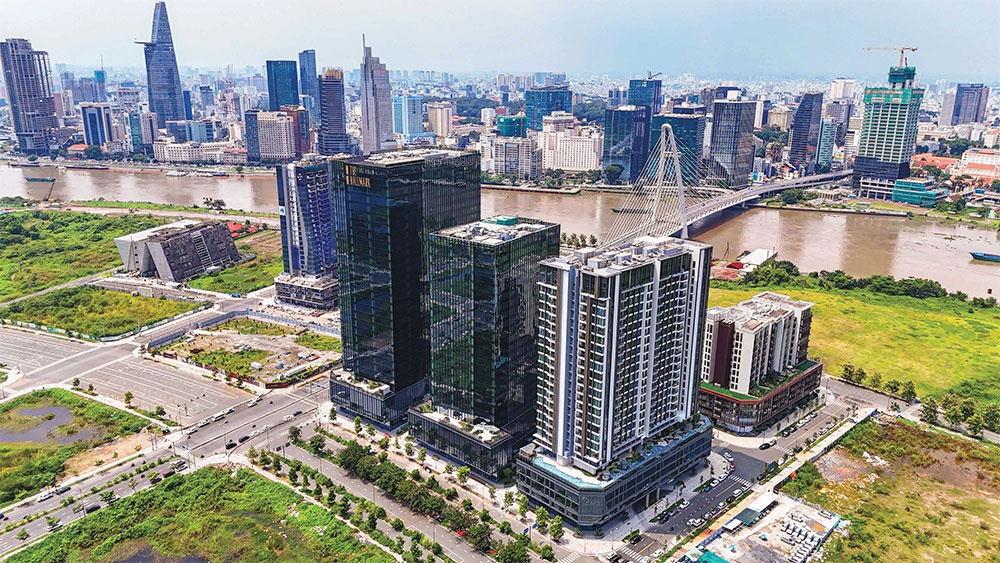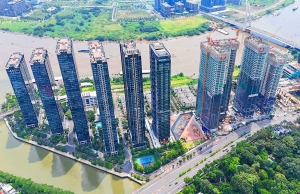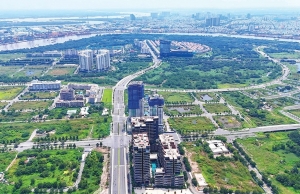Clarity at the heart of plan on owner figures
The Administrative Management Police Department under the Ministry of Public Security (MPS) recently signed a cooperation agreement with Vietnam Post Corporation to implement the proposal.
Accordingly, the system will be set up based on the postal system, which already possesses information about house numbers. Local law enforcement has data on household registration, and the MPS has data on the population and property documents.
 |
| The country wants to tighten real estate regulations after some years of unpredictability, photo Le Toan |
The department said that it is in the process of coordinating with the post office as well as the ministry to craft solutions on the house number determination plan.
The identification of homes owned by individuals aims to implement the prime minister’s direction on restoring order and overcoming inadequacies with investment consulting, and construction and transportation projects.
Lieutenant colonel Nguyen Thanh Vinh, director of the National Population Data Centre under the MPS, said that identifying house numbers will bring many benefits to people as well as local management agencies.
“The first goal is to create a real estate identification network associated with each citizen, making it convenient to find homes by address and delivery, ensuring the quality of urban development. The next very basic goal is to make real estate assets transparent and develop the real estate market healthily. The number of buildings that a person owns will be collected in complete data that will be easy to trace and manage,” Vinh said.
In terms of benefits, identifying house numbers will help management authorities control certain data regarding those properties. This will contribute to preventing speculation, tax evasion, and money laundering via the real estate market, he added.
In addition, the plan could help people carry out real estate transactions more conveniently, avoiding address confusion. In addition, identifying house numbers will help state management agencies perform management tasks more effectively, such as collecting taxes, issuing construction permits, and checking fire safety.
Le Minh Duc, founder of Remaps, an online platform providing real estate purchasing services and looking up real estate project maps, said that the policy will have a positive impact, reducing speculation and hoarding as well as helping low-income people attain more opportunities to access housing.
“Strictly managing real estate is a trend in many countries, especially when applying IT to management. This policy will also help to set up regulations on taxes imposed on people who have many real estate assets that should have been reserved for lower-income earners,” Duc said.
Currently, the Ministry of Construction and the Ministry of Natural Resources and Environment are responsible for building data on the number of homes. The goal is to specifically number each house, apartment, and plot of land under unified rules. From that, the MPS will collect a database of house numbers, plus information collected from People’s Committees at all levels, on the principle of standardising data.
The Ministry of Finance is also researching and building a real estate tax law, including research on taxes on second homes, vacant houses, and land. It is expected to be added to the 2024 Law and Ordinance Development programme and discussed in 2025.
 | Another push for real estate bounce Vietnam’s government aims to boost its real estate sector by easing bank credit and tackling legal, land, and administrative hurdles to foster market growth. |
 | Expansion potential despite downturn in real estate M&As Pressured by the global downturn, in the domestic market, there were fewer merger and acquisition (M&A) transactions in Vietnam’s real estate in 2023, with a lower total value than in 2022. |
 | Offloading assets a last resort for groups Burdened by large debts and complex capital mobilisation channels, many domestic real estate businesses are looking to sell off their assets as a last resort. |
 | Industrial real estate developers ready to seize on economic rebound As Vietnam's economy is forecast to rebound in 2023, industrial real estate developers are looking to capitalise on opportunities in the market. |
What the stars mean:
★ Poor ★ ★ Promising ★★★ Good ★★★★ Very good ★★★★★ Exceptional
Related Contents
Latest News
More News
- Dong Nai experiences shifting expectations and new industrial cycle (January 28, 2026 | 09:00)
- An Phat 5 Industrial Park targets ESG-driven investors in Hai Phong (January 26, 2026 | 08:30)
- Decree opens incentives for green urban development (January 24, 2026 | 11:18)
- Public investment is reshaping real estate’s role in Vietnam (January 21, 2026 | 10:04)
- Ho Chi Minh City seeks investor to revive Binh Quoi–Thanh Da project (January 19, 2026 | 11:58)
- Sun Group launches construction of Rach Chiec sports complex (January 16, 2026 | 16:17)
- CEO Group breaks ground on first industrial park in Haiphong Free Trade Zone (January 15, 2026 | 15:47)
- BRIGHTPARK Entertainment Complex opens in Ninh Binh (January 12, 2026 | 14:27)
- Ho Chi Minh City's industrial parks top $5.3 billion investment in 2025 (January 06, 2026 | 08:38)
- Why Vietnam must build a global strategy for its construction industry (December 31, 2025 | 18:57)

 Tag:
Tag:



















 Mobile Version
Mobile Version